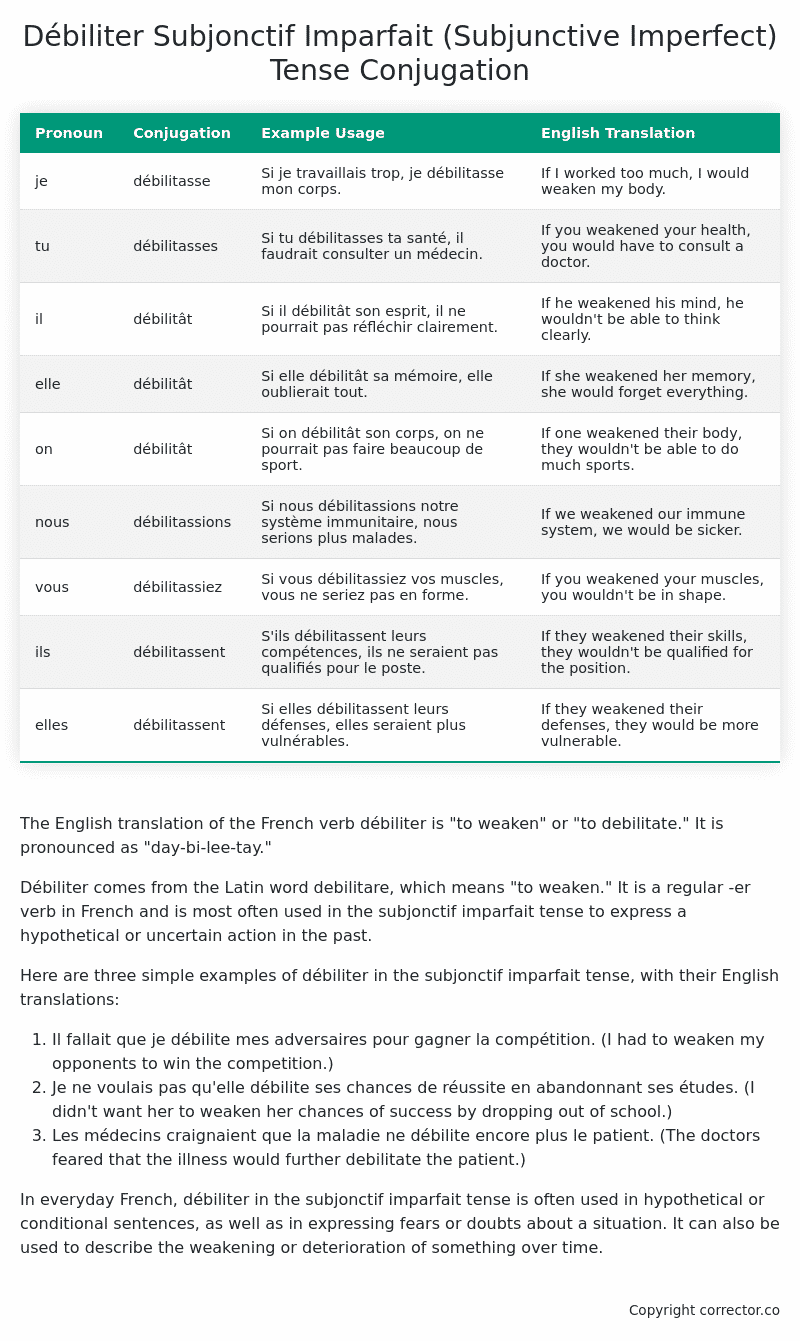Subjonctif Imparfait (Subjunctive Imperfect) Tense Conjugation of the French Verb débiliter
Introduction to the verb débiliter
The English translation of the French verb débiliter is “to weaken” or “to debilitate.” It is pronounced as “day-bi-lee-tay.”
Débiliter comes from the Latin word debilitare, which means “to weaken.” It is a regular -er verb in French and is most often used in the subjonctif imparfait tense to express a hypothetical or uncertain action in the past.
Here are three simple examples of débiliter in the subjonctif imparfait tense, with their English translations:
- Il fallait que je débilite mes adversaires pour gagner la compétition. (I had to weaken my opponents to win the competition.)
- Je ne voulais pas qu’elle débilite ses chances de réussite en abandonnant ses études. (I didn’t want her to weaken her chances of success by dropping out of school.)
- Les médecins craignaient que la maladie ne débilite encore plus le patient. (The doctors feared that the illness would further debilitate the patient.)
In everyday French, débiliter in the subjonctif imparfait tense is often used in hypothetical or conditional sentences, as well as in expressing fears or doubts about a situation. It can also be used to describe the weakening or deterioration of something over time.
Table of the Subjonctif Imparfait (Subjunctive Imperfect) Tense Conjugation of débiliter
| Pronoun | Conjugation | Example Usage | English Translation |
|---|---|---|---|
| je | débilitasse | Si je travaillais trop, je débilitasse mon corps. | If I worked too much, I would weaken my body. |
| tu | débilitasses | Si tu débilitasses ta santé, il faudrait consulter un médecin. | If you weakened your health, you would have to consult a doctor. |
| il | débilitât | Si il débilitât son esprit, il ne pourrait pas réfléchir clairement. | If he weakened his mind, he wouldn’t be able to think clearly. |
| elle | débilitât | Si elle débilitât sa mémoire, elle oublierait tout. | If she weakened her memory, she would forget everything. |
| on | débilitât | Si on débilitât son corps, on ne pourrait pas faire beaucoup de sport. | If one weakened their body, they wouldn’t be able to do much sports. |
| nous | débilitassions | Si nous débilitassions notre système immunitaire, nous serions plus malades. | If we weakened our immune system, we would be sicker. |
| vous | débilitassiez | Si vous débilitassiez vos muscles, vous ne seriez pas en forme. | If you weakened your muscles, you wouldn’t be in shape. |
| ils | débilitassent | S’ils débilitassent leurs compétences, ils ne seraient pas qualifiés pour le poste. | If they weakened their skills, they wouldn’t be qualified for the position. |
| elles | débilitassent | Si elles débilitassent leurs défenses, elles seraient plus vulnérables. | If they weakened their defenses, they would be more vulnerable. |
Other Conjugations for Débiliter.
Le Present (Present Tense) Conjugation of the French Verb débiliter
Imparfait (Imperfect) Tense Conjugation of the French Verb débiliter
Passé Simple (Simple Past) Tense Conjugation of the French Verb débiliter
Passé Composé (Present Perfect) Tense Conjugation of the French Verb débiliter
Futur Simple (Simple Future) Tense Conjugation of the French Verb débiliter
Futur Proche (Near Future) Tense Conjugation of the French Verb débiliter
Plus-que-parfait (Pluperfect) Tense Conjugation of the French Verb débiliter
Passé Antérieur (Past Anterior) Tense Conjugation of the French Verb débiliter
Futur Antérieur (Future Anterior) Tense Conjugation of the French Verb débiliter
Subjonctif Présent (Subjunctive Present) Tense Conjugation of the French Verb débiliter
Subjonctif Passé (Subjunctive Past) Tense Conjugation of the French Verb débiliter
Subjonctif Imparfait (Subjunctive Imperfect) Tense Conjugation of the French Verb débiliter (this article)
Subjonctif Plus-que-parfait (Subjunctive Pluperfect) Tense Conjugation of the French Verb débiliter
Conditionnel Présent (Conditional Present) Tense Conjugation of the French Verb débiliter
Conditionnel Passé (Conditional Past) Tense Conjugation of the French Verb débiliter
L’impératif Présent (Imperative Present) Tense Conjugation of the French Verb débiliter
L’infinitif Présent (Infinitive Present) Tense Conjugation of the French Verb débiliter
Struggling with French verbs or the language in general? Why not use our free French Grammar Checker – no registration required!
Get a FREE Download Study Sheet of this Conjugation 🔥
Simply right click the image below, click “save image” and get your free reference for the débiliter Subjonctif Imparfait tense conjugation!

Débiliter – About the French Subjonctif Imparfait (Subjunctive Imperfect) Tense
Formation
Common Everyday Usage Patterns
Interactions with Other Tenses
Subjonctif Présent
Indicatif Passé Composé
Conditional
Conditional Perfect
Summary
I hope you enjoyed this article on the verb débiliter. Still in a learning mood? Check out another TOTALLY random French verb conjugation!


